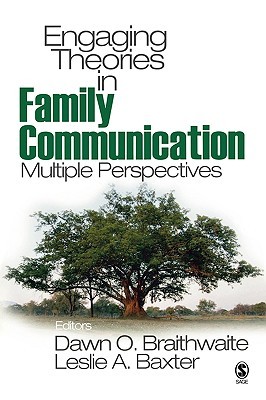
- We will send in 10–14 business days.
- Publisher: Sage Publications
- ISBN-10: 0761930612
- ISBN-13: 9780761930617
- Format: 15.4 x 22.9 x 2.1 cm, minkšti viršeliai
- Language: English
- SAVE -10% with code: EXTRA
Engaging Theories in Family Communication (e-book) (used book) | bookbook.eu
Reviews
Description
Engaging Theories in Interpersonal Communication: Multiple Perspectives highlights key theories used to guide interpersonal communication research. The Second Edition features 30 theory chapters written by leading scholars in interpersonal communication, including new coverage of evolutionary theories, Problematic Integration Theory, supportive communication theories, Theory of Motivated Information Management, critical approaches to interpersonal communication, and Media Multiplexity Theory. Each theory chapter follows the same structure to help readers easily find and compare information across theories. An updated introductory chapter maps the history and the current state of interpersonal communication theory since publication of the first edition, based on comprehensive analysis of published scholarship. Presenting both classic and cutting-edge issues, the book organizes theories into three clusters—theories that are individually-centered; theories that are focused on discourse and interaction processes; and theories that examine how communication functions in personal relationships. All authors interweave abstract theoretical concepts with concrete examples in order to maximize readability and comprehension.
This book is the winner of the 2017 NCA Gerald R. Miller Book Award.
EXTRA 10 % discount with code: EXTRA
The promotion ends in 23d.20:17:09
The discount code is valid when purchasing from 10 €. Discounts do not stack.
- Publisher: Sage Publications
- ISBN-10: 0761930612
- ISBN-13: 9780761930617
- Format: 15.4 x 22.9 x 2.1 cm, minkšti viršeliai
- Language: English English
Engaging Theories in Interpersonal Communication: Multiple Perspectives highlights key theories used to guide interpersonal communication research. The Second Edition features 30 theory chapters written by leading scholars in interpersonal communication, including new coverage of evolutionary theories, Problematic Integration Theory, supportive communication theories, Theory of Motivated Information Management, critical approaches to interpersonal communication, and Media Multiplexity Theory. Each theory chapter follows the same structure to help readers easily find and compare information across theories. An updated introductory chapter maps the history and the current state of interpersonal communication theory since publication of the first edition, based on comprehensive analysis of published scholarship. Presenting both classic and cutting-edge issues, the book organizes theories into three clusters—theories that are individually-centered; theories that are focused on discourse and interaction processes; and theories that examine how communication functions in personal relationships. All authors interweave abstract theoretical concepts with concrete examples in order to maximize readability and comprehension.
This book is the winner of the 2017 NCA Gerald R. Miller Book Award.


Reviews